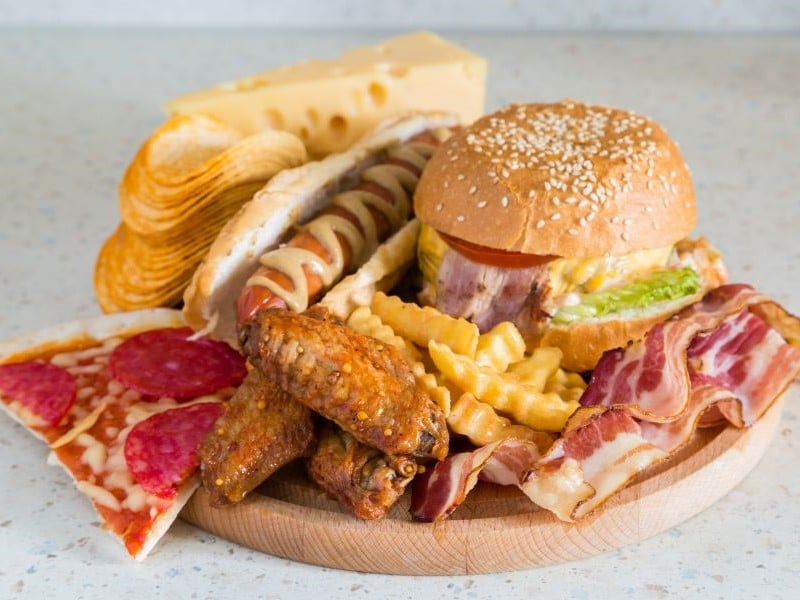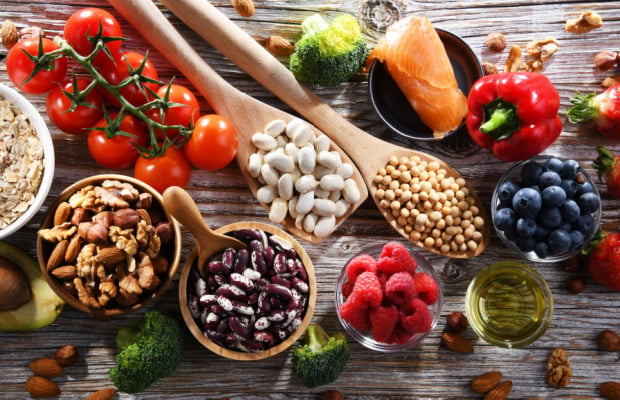Too much saturated fat in your diet can raise your cholesterol levels, but a healthy balanced diet can help to lower them. Certain foods have also been shown to help lower cholesterol levels.
Foods that lower cholesterol
1. Unsaturated fats
A low-fat diet may be the first thing you think about when it comes to lowering cholesterol. But rather than reducing all fats, it’s more important to get the right types of fats in your diet.
Too much saturated fat is linked to raised cholesterol levels, and national dietary surveys tell us that most of us eat more than is recommended.
Swapping saturated fats like butter, lard and ghee for unsaturated fats such as olive oil, rapeseed oil or sunflower oil can help to maintain healthy cholesterol levels.
It’s also important to be aware of the amount of saturated fat in foods we eat. Some of the top sources in our diet are foods like fatty meats, biscuits, cakes, pastry and chocolate.
- Check the labels of food you buy for high levels of saturated fat. Think of foods you could try instead, for example, more oily fish instead of red and processed meats.
2. Oats and barley
Oats and barley contain a type of soluble fibre called beta glucans. This forms a gel in the gut which helps to stop cholesterol from being absorbed into the body. When we eat 3g a day, it can help to maintain healthy cholesterol levels.
To give you an idea of what this means for your diet, a bowl of porridge made with 40g of oats will provide around 1.4g of beta glucans. So aim for two to three portions of oat or barley foods a day.
- Try having porridge or muesli made with oats for breakfast, oatcakes instead of wheat-based crackers at lunch or as a snack and try pearl barley instead of rice in soups and risotto.
- Our beetroot barley risotto uses barley instead of rice for higher fibre option.
3. Beans and lentils
Beans, peas and lentils are good sources of soluble fibre too. You can also swap red and processed meat for plant-based proteins like these, which will lower the saturated fat in your diet. Cook dried beans or lentils or use those tinned in water for convenience.
- Baked beans count too – they are based on haricot beans – and are a good option if you’re not used to including beans and lentils in your diet. Just try to use ones that have reduced sugars and salt.
- Try our homemade baked beans recipe for a healthier alternative to tinned versions.
4. Nuts and seeds
Nuts are a good source of unsaturated fats as well as fibre and other nutrients. They are filling to eat and make a tasty and convenient swap for snacks like chocolate, cakes and biscuits, which are usually high in saturated fat.
Used in this way they can help lower your cholesterol levels. Just make sure you choose plain ones to avoid adding extra salt or sugar to your diet.
- A portion is a small handful – about 30g. Choose whichever nuts you like or, even better, a mixture of nuts and seeds to benefit from a wider range of nutrients.
5. Fruit and vegetables
We should all be eating at least our 5-a-day but while this is a well-known recommendation, most of us still aren’t managing to eat this much fruit and veg.
One benefit to eating more is that they are a source of fibre and eating more fibre is linked to a lower risk of heart and circulatory diseases.
Fruit and vegetables contain both insoluble and soluble fibre which makes them a great choice that could also help to reduce your cholesterol levels.
- Fresh, frozen, tinned and dried all count. Try fruit and vegetables as snacks to help reduce the biscuits, cake and chocolate you eat. Adding more fruit and vegetables to your meals can also help make them more filling, meaning you might snack less.
Even if you are doing all the right things for your diet your doctor or nurse might still recommend you take medication. You might feel disheartened by this, but it’s important to remember that the effect of dietary changes can vary from person to person, and we can’t control all the factors that affect our cholesterol levels and our overall risk of heart attack and stroke. If you do need to take cholesterol-lowering medication, don’t give up on your diet as it will support your treatment and help to lower your risk.
What to read next...









